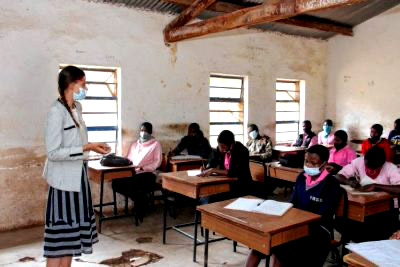“Peace Corps service needed more than ever” by John Bidwell (Mali)

Cameron Beach, teaches children in Dedza, near Lilongwe, Malawi, Friday, July 23, 2021. Beach, a former Peace Corps volunteer, is living in rural Malawi teaching English at a rural high school where she had been sent by the United States government 18-months before COVID-19 began sweeping the world. (AP Photo/Roy Nkosi)
This month the Peace Corps turns 60. President Kennedy signed the legislation that created the Peace Corps in September 1961, deepening through action, our key national values of service, sacrifice, dedication, and learning from those we serve.
The Peace Corps goals are to serve others in interested countries, bring a better understanding of our country to others, and bring a better understanding of others home.
My wife, Kris Holloway, and I are proud to have served, joining more than 240,000 nationwide over the past six decades.
I entered to bring my skills and commitment to others (and see the world, after growing up in a very small New Hampshire town). I departed enriched and grateful. My life was forever changed for the better.
Kris and I worked in remote Malian villages. I trained teams of men in well repair. Kris and I funded the rebuilding of the village maternity and school latrines and conducted health training, such as the making of oral hydration drink for dehydrated children. Common to all this work was how much we did for so little money. A hundred dollars could make a well safer and provide cleaner drinking water to hundreds of villagers. The maternity took a couple of thousand dollars. Oral rehydration drink took pennies.
Our experience is not unique, and the Peace Corps impact is widely recognized. Kul Chandra Gautam, former Nepalese diplomat and former deputy executive director of UNICEF (July 2020) said:
The world wants and needs Peace Corps more than ever.
This Peace Corps anniversary, though, is unique as the pandemic means no volunteers in the field. This unprecedented moment has provided an opportunity to reflect on what the Peace Corps has accomplished and picture what should come next. With that in mind, the National Peace Corps Association convened a series of nationwide conversations.
Here is what they heard. Returned Peace Corps volunteers envision an agency that 1) advances global peace and understanding, 2) seeks innovative solutions to shared global problems, and 3) responds to shifting expectations in the developing world. In addition, respondents want an agency that addresses systemic racism, gender-based discrimination, and climate change. Lastly, they want Peace Corps to genuinely listen to global partners so that they can provide the best that America has to offer.
Peace Corps has done a lot of positive work for a long time, and for very little taxpayer investment. The International Affairs Budget is roughly 1% of all federal spending, and Peace Corps is only 1% of the International Affairs Budget. Adding up all congressional line item appropriations over its entire history, the total funding for all Peace Corps comes to just under $12.8 billion. Compare that to the one-year fiscal 2021 International Affairs Budget of $57.4 billion. In other words, 60 years of Peace Corps funding is the equivalent of three months of our current international affairs budget.
Peace Corps has made a tremendous contribution to the individuals and communities in which they served, and to our world. Won’t you join us in celebrating the Peace Corps’ 60th anniversary and ensuring its resurgence by urging your member of Congress to co-sponsor the Peace Corps Reauthorization Act (HR 1456)?
Help deepen our nation’s commitment to service, peace, sacrifice, commitment, and, yes, humility — learning from others whom we hope to serve.
•
John Bidwell is Executive Director of United Way of the Franklin and Hampshire Region, Northampton, MA. He served in Mali as a water resource manager from 1989-1991 and is the editor of Monique and the Mango Rains, the book his wife Kris Holloway authored that chronicles their Peace Corps experience.

Thank you, John Bidwell.
My bookshelves are crammed with Peace Corps memoirs — but Kris Holloway’s “Monique and the Mango Rains” still tugs at my heart.